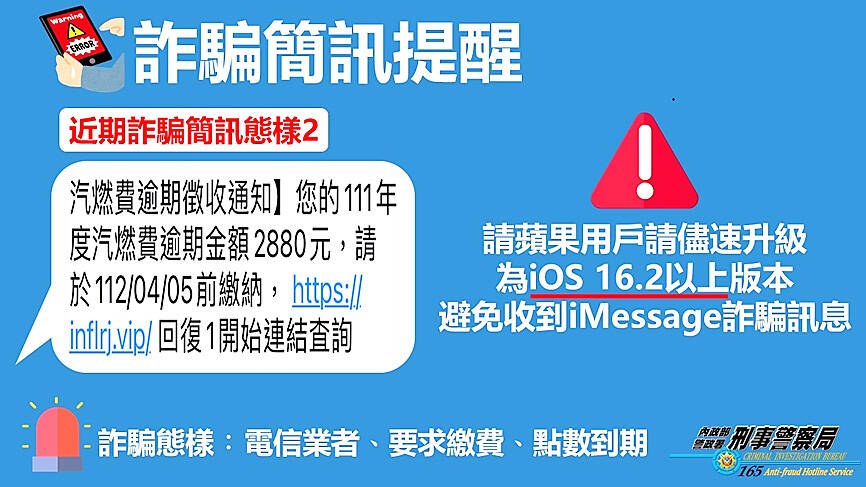iPhone users should update their iOS and activate a function to filter messages from unknown senders to avoid receiving scam messages through the iMessage system, the Criminal Investigation Bureau said on Sunday.
The bureau issued the warning after many callers to its “165” anti-fraud hotline had called to report that they were scammed after tapping on links in messages they received from the iMessage system.
A woman in New Taipei City surnamed Lin (林) received a scam message that said she has not paid a vehicle fuel surcharge, the bureau said, adding that the message looked like it was sent from the Taipei Motor Vehicle Office.

Photo courtesy of the Criminal Investigation Bureau
Lin lost about NT$100,000 after following the link and entering her credit card number and authentication code, the bureau said.
A woman in Taichung surnamed Lee (李) had NT$80,000 charged to her credit card after clicking on a link in a phishing message, which scammers falsely showed as being sent from Chunghwa Telecom, the bureau said.
“We recently received dozens of complaints through the 165 anti-fraud hotline about fraudulent text messages sent via iMessage,” the bureau said.
“Our analysis showed that iOS version 16.2 cannot filter unknown or scam calls, which allowed iPhone users to be targeted by scammers,” the bureau said.
The bureau reported a “massive number” of fraudulent messages being sent via the iMessage system to trick people into following phishing links.
“Clicking on some links can allow malicious programs to be installed on iPhones, giving scammers access to authentication codes and personal and financial information,” the bureau said.
To block suspicious messages, iPhone users should upgrade to the latest iOS version, it said.
“They should go to the settings, click on ‘Messages,’ activate the function to filter unknown and spam calls, and then turn on the ‘filter unknown sender’ function,” it said.
Fraud can be reported to the 165 National Fraud Prevention Web site, or via the Police Service app.
People should attach screenshots or copies of the text messages, in addition to providing their names and contact information, the bureau said.

National Kaohsiung University of Science and Technology (NKUST) yesterday promised it would increase oversight of use of Chinese in course materials, following a social media outcry over instances of simplified Chinese characters being used, including in a final exam. People on Threads wrote that simplified Chinese characters were used on a final exam and in a textbook for a translation course at the university, while the business card of a professor bore the words: “Taiwan Province, China.” Photographs of the exam, the textbook and the business card were posted with the comments. NKUST said that other members of the faculty did not see

The Taipei City Government yesterday said contractors organizing its New Year’s Eve celebrations would be held responsible after a jumbo screen played a Beijing-ran television channel near the event’s end. An image showing China Central Television (CCTV) Channel 3 being displayed was posted on the social media platform Threads, sparking an outcry on the Internet over Beijing’s alleged political infiltration of the municipal government. A Taipei Department of Information and Tourism spokesman said event workers had made a “grave mistake” and that the Television Broadcasts Satellite (TVBS) group had the contract to operate the screens. The city would apply contractual penalties on TVBS

A new board game set against the backdrop of armed conflict around Taiwan is to be released next month, amid renewed threats from Beijing, inviting players to participate in an imaginary Chinese invasion 20 years from now. China has ramped up military activity close to Taiwan in the past few years, including massing naval forces around the nation. The game, titled 2045, tasks players with navigating the troubles of war using colorful action cards and role-playing as characters involved in operations 10 days before a fictional Chinese invasion of Taiwan. That includes members of the armed forces, Chinese sleeper agents and pro-China politicians

The lowest temperature in a low-lying area recorded early yesterday morning was in Miaoli County’s Gongguan Township (公館), at 6.8°C, due to a strong cold air mass and the effect of radiative cooling, the Central Weather Administration (CWA) said. In other areas, Chiayi’s East District (東區) recorded a low of 8.2°C and Yunlin County’s Huwei Township (虎尾) recorded 8.5°C, CWA data showed. The cold air mass was at its strongest from Saturday night to the early hours of yesterday. It brought temperatures down to 9°C to 11°C in areas across the nation and the outlying Kinmen and Lienchiang (Matsu) counties,